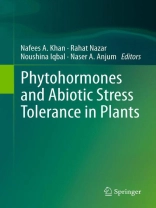Plants are sessile and prone to multiple stresses in the changing environmental conditions. Of the several strategies adopted by plants to counteract the adverse effects of abiotic stress, phytohormones provide signals to allow plants to survive under stress conditions. They are one of the key systems integrating metabolic and developmental events in the whole plant and the response of plants to external factors and are essential for many processes throughout the life of a plant and influence the yield and quality of crops. The book ‘Phytohormones and Abiotic Stress Tolerance in Plants’ summarizes the current body of knowledge on crosstalk between plant stresses under the influence of phytohormones, and provides state-of-the-art knowledge of recent developments in understanding the role of phytohormones and abiotic stress tolerance in plants. This book presents information on how modulation in phytohormone levels affect regulation of biochemical and molecular mechanisms.
قائمة المحتويات
Signal transduction of pytohormones under abiotic stresses.- Cross-talks on phytohormones signaling pathways under optimal and stressful conditions.- Phytohormones in salinity tolerance: ethylene and gibberellins cross talk.- Nitric oxide metabolism under environmental stress conditions.- Auxin as part of wound-healing response in plants.- Interaction between ethylene, auxin, light and microtubules during low-p H induced root hair formation in lettuce seedlings.- Cytokinin homeostasis.- Origin of brassinosteroids and their role in oxidative stress in plants.- Hormonal intermediates in the protective action of exogenous phytohormones in plants under salinity: A case study on wheat.- The role of phytohormones in the control of plant adaptation to oxygen depletion.- Stress hormones associated to sunflower germplasms with different sensitivity to drought.- An insight into the relationship between jasmonates and salicylic acid in salt tolerance.












